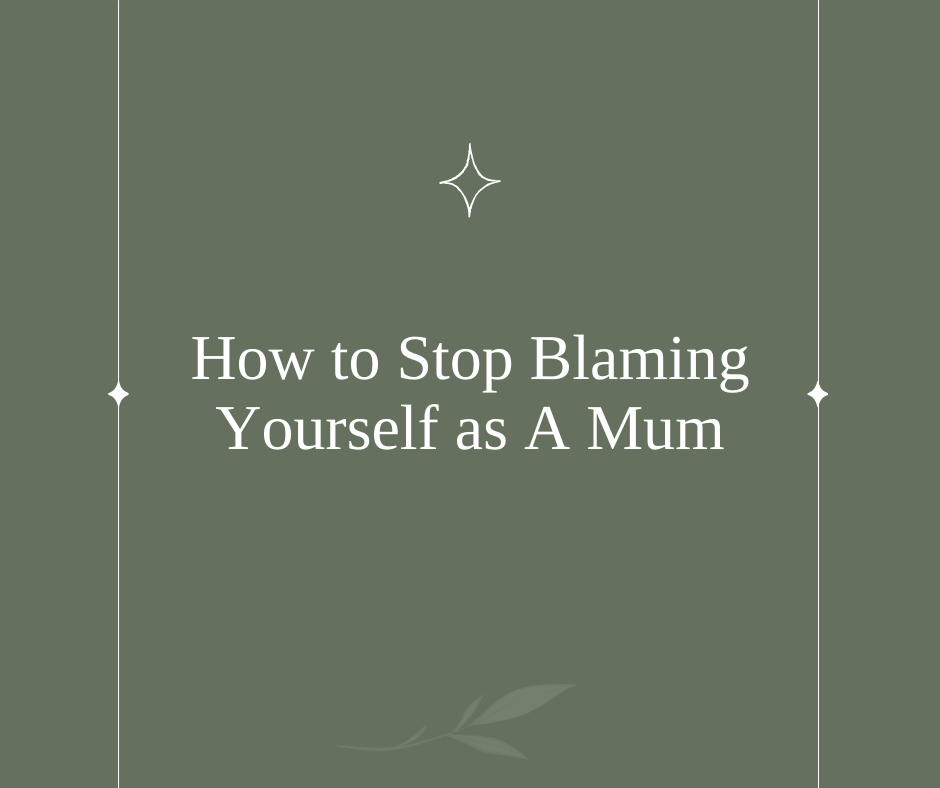What is Self-Blame?
Self-blame is the process of attributing a stressful event or situation to yourself. Self-blaming thoughts are often self-critical and fault-finding. They can make us feel guilty, ashamed or regretful.
How Does Self-Blame Impact Mums?
Self-blame and motherhood are closely linked. If you have difficulty getting pregnant, it can even show up before conception. Many women who have experienced infertility describe having thoughts like ‘my body can’t do what it is designed to do’ and ‘it’s my fault I can’t get/stay pregnant’. Read Living with Infertility – A Therapists Perspective for more on this topic.
Birth is another area where self-blame can crop up, especially if it doesn’t go to plan or, at worst, becomes traumatic. This can trigger thoughts like ‘I wasn’t strong enough to experience labour and birth’ or ‘other women have been giving birth for centuries without pain relief, but I needed an epidural’. Coping With Birth Trauma might help if you’re struggling with PTSD after childbirth.
The potential for self-blame continues during the postnatal period. Although it’s not uncommon to struggle with breastfeeding for a variety of reasons, many women blame themselves and their bodies for ‘letting them down’ or ‘failing to do the most natural thing in the world’. In reality, breastfeeding rarely comes naturally to anyone. I’ve written more about this in How to Look After Yourself If You’re Unable to Breastfeed.
Essentially, whenever you struggle as a mother, this can be an opportunity for self-blame to show up. ‘Other mums are coping better than me’. ‘Sarah has three kids and she’s smashing it, but I’ve only got one and I’m finding it hard’. ‘What’s wrong with me, why can’t I cope like everyone else?’. To be honest, it’s probably hard to find a mother who hasn’t experienced thoughts like this at some point.
Unfortunately, self-blame correlates highly with depression because our thoughts have a huge impact on how we feel. It’s hard to say whether depression causes self-blame, or we become depressed because of it, but either way, it doesn’t do us much good.
Where Does It Come From?
Self-blame is linked to our life experiences, particularly in childhood. Those with higher self-blame may have experienced emotional abuse as a child and have a history of unmet core emotional needs (such as self-expression and self-appreciation). It can also be as simple as being blamed a lot as a child. Your view of yourself, others and the world will be affected by this.
For example, if you were often blamed for things that were not your fault, you may have learnt to attribute blame to yourself. If, in adult life, you are also blamed for things that aren’t your fault, this can reinforce your early life experiences. Perhaps your parents or caregivers praised you for getting things right, but shamed and blamed you for getting things wrong. This teaches you that getting things right is good, and getting things wrong is bad and deserving of blame and/or punishment.
Those with high self-blame are likely to have strong, overdeveloped critic voices and underdeveloped self-compassion. This means it can be extremely difficult for people with a tendency for self-blame to show themselves compassion.
How to Stop Blaming Yourself as a Mum
- Forgive yourself for making mistakes. Try to view yourself as a whole person with positive qualities as well as short comings. You are not your failures/mistakes. We are human and it’s entirely normal and acceptable to get things wrong.
- Take action on the things you can do something about. This may be learning to challenge your self-blaming thoughts instead of accepting them as factual. This takes inner strength which you may struggle with, so reaching out to a therapist can help support you with that.
- Intentionally practice self-compassion. This may be difficult and feel almost impossible if you have a high amount of self-blame. But it can be done. It takes effort to learn this skill and potentially the support of a therapist. My free guide, Learning to Love Yourself, is a good place to start.
- Try to reduce comparing your life, qualities and motherhood journey to others. It’s true what they say - comparison is the thief of joy. Comparing yourself to others not only makes you feel bad, it can also create the perfect environment for self-critical thoughts to emerge.
Find Out More
Do you relate to the examples described above? If you need more support to overcome self-blame and you’re interested in working with me, you can book a free consultation here. I also share lots of tips and advice via Instagram.
Useful Links
Understanding Your Critical Voice
How Self-Compassion Can Help You Parent
Get Free Support Today
If you are craving free, actionable support today, come and join The Nurture Toolbox - a bi-weekly dose of actionable tips and prompts, delivered straight to your inbox. Each email will support and nurture you on your motherhood journey. Subscribe now by clicking the link below. I can't wait to support you.
